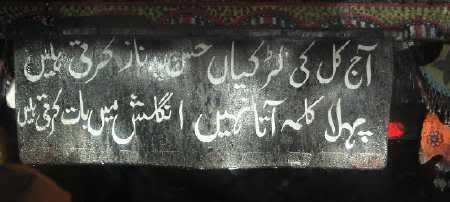Adil Najam
Sepoy, of Chapati Mystery fame, sent me this picture before. It is a crude sheyr (verse) crudely written at the back of a bus.

Girls these days are so proud of their beauty
They don’t know the first kalma, but speak in English
Sepoy said it made him chuckle. It makes me chuckle too. But it also makes me shudder a bit. And not just for the (lack of) poetic skills displayed here. The verse and its display probably says more about the way we view women – especially young women – than it does about the state of poetry in the country.
![]()
Notwithstanding the fact that not just rhyme but reason is also missing here and the first and second misras have little connection, the verse does suggest what is viewed good (knowing the pehla kalma) and what is not (speaking in English).
All too often people will presume that a certain behavior correlates to certain moral positions. I remember how we wrote on ATP about an Ad in Dawn’s classified section for
Thinking about the ad and all the societal assumptions imbedded in it still makes me mad. As did this interesting post from ATP friend Mansoor on Metroblog Karachi, where he writes about a new way of stealing cellphones that as practiced in Karachi.
A girl is standing at a bus stop, waiting to catch a bus to go home and talking on her cellphone. There are quite many people around and its daytime.
Two guys on a bike pull up in front of her, the guy on the back gets off the bike, comes in front of her, and without warning, plants a loud slap right on her face! The girl is stunned, cant even utter a word. He then shouts (for the benefit of whoever is listening) “kitney dafa bola hai! Abba ka cellphone nahi lay kar nikla karo” (how many times have i told you, not to take dads cellphone out), grabs her cell, gets back on the bike, and they both drive away.
The girl is too shocked to say anything and just stands there, her hand holding an imaginary cellphone to her ear. People around ignore the situation thinking its just some family tiff or the other…. till she screams out “ye mera bhai nahi tha!!!!!!!” (he was not my brother!!!!!)
What I found notable is that even though the post generated intense discussion it was mostly focused on crime prevention and law enforcement and very little about what – to me – was the most shocking line of all:
People around ignore the situtation thinking its just some family tiff or the other…
Wait, wait, wait. Please. It is OK if someone comes and slap their sister or wife or daughter in public? Or even in private? And the rest of us will say, ‘OK, its a family tiff.’
I must confess that I am shocked most because in my heart of heart I know that many people will, in fact, do exactly that. And, that, is the tragedy of it all.



















































“larkian parh rahi hain angraizi
dhoond li qaum ne falah ki rah
yeh drama dikhaye ga kiya scene
pardah uthne ki muntazir hai nigah”
Is this short poem really written by Allama Iqbal. And where was this book published Khadija Amjad has referred to. The post-independence editions of books of Iqbal are mostly published in Lahore, Pakistan.
I always thought there was only one Kalima. Isn’t that so anymore?
kal jau bay parda nazar aain chand bibian
akbar zameen main ghairat-e-qaumi say ghar gaya
poocha jau un say woh aap ka parda kya hua
kehnay lagin aqal pay mardon ki parh gaya
This is an important issue. I personally am of the opinion that the best solution to these problems is to empower women. This chauvinism has more to do with economics than anything else.
This post points to something very important – and I have to ask if the people standing around the girl were not outraged enough at what was happening before their eyes to intervene, or were they just not socialised to accept that this kind of behavior by the boys is unacceptable whether they are family or not?
There also seems to be a big issue with speaking English. When I was in my mid-teens I found an old poem (I forget the name) by Allama Iqbal in a pre-partition edition of his ‘Bang-e-Dara’ in which some verses struck me as a bit crude. They kept me awake the whole night when I read them, and have stayed with me ever since:
larkian parh rahi hain angraizi
dhoond li qaum ne falah ki rah
yeh drama dikhaye ga kiya scene
pardah uthne ki muntazir hai nigah
I later found the poem curiously absent in more recently published versions of the same book.
And I am very proud to report that I am a Pakistani woman from a very traditional family who can both speak English and recite the first kalima:)